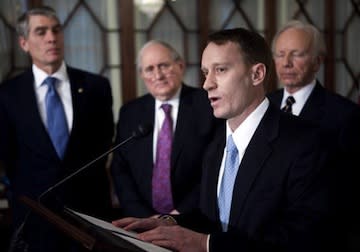 The Lookout
The LookoutAdvocates of repealing ‘don’t ask, don’t tell’ are ready to re-enlist

Former Army Sgt. Stacy Vasquez and Air Force Maj. Mike Almy became leaders for the movement to repeal the military's ban on openly gay servicemembers. The military veterans who were discharged for being gay lectured senators in press conferences on Capitol Hill, argued their case on TV news, and even walked down the red carpet at the MTV Video Music Awards with musician Lady Gaga.
But when "don't ask, don't tell" officially ends on Tuesday, Vasquez and Almy hope to return to a normal life in the military. They're ready to put the painful details of their discharges behind them.
Almy served 13 years in the Air Force and was deployed four times to the Middle East before he was kicked out in 2006 after an Air Force comrade from a different unit discovered Almy's emails to his boyfriend on a shared computer. A commanding officer authorized a search of Almy's emails, and he was discharged in 2006, even though he never admitted to the military that he was gay.
"Really it's been my whole adult life--I want to get back in because I just miss the people, the camaraderie, the mission," Almy said in an interview with The Lookout. "I also want a retirement. I lost all retirement benefits when they kicked me out."
Almy worries that it might not be so easy to get back in. All of the 13,500 men and women who were discharged under don't ask, don't tell since 1993 are allowed to attempt to re-enlist now, but they will not receive any special treatment. They will have to pass age requirements, physical fitness tests and other standards before being let back in. Those who have aged out can apply for a waiver, but there's no guarantee it will be approved. (The New York Times reports that hundreds of don't ask, don't tell veterans have contacted recruiting offices to rejoin.)
"My particular career field has changed a bit ... At this point I'm five years behind my peers," says Almy, a former communications officer who has worked for a defense contractor since his discharge.
He hopes his advocacy won't affect how his comrades see him. "Obviously once I get back in the military, I am a little high profile so people are probably going to know who I am. If anything it might make me the subject of some good-natured jokes, some ribbing. I don't think it would be an obstacle to my service in the military."
Vasquez--who joined the military when she was only 17 years old and was discharged 12 years later in 2003--has already begun the process to join the Army reserves as an officer. Vasquez worked her way up from enlisted recruit to sergeant first class, but she would have to re-enlist three grades lower than that because she's been out of the Army for so long. But she can join as an officer now because she went to college and got a master's degree after her discharge.
Vasquez has been working for the federal government--though she mysteriously refused to say in what capacity--and plans on keeping that job if she is accepted in the reserves. ("I work for the federal government, but that's all I can say about that," she told The Lookout.)
"I think it will be [a non-issue] for straight people, but for the gay people there is really, really going to be a weight lifted off their shoulders," Vasquez said of Tuesday's big change.
Both say they've moved beyond the circumstances of their discharges.
"I don't think that I ever felt betrayed. I was more embarrassed and ashamed that I had been discharged," Vasquez says. "I felt like maybe I did a bad job for a while when in reality it was just about being gay. As long as I'm judged fairly and equally that's all I care about."
Almy says he's not angry at the Air Force anymore for searching his emails. "It was very painful and difficult what I went through, but there are much bigger benefits to serving in the military. I wouldn't change that for anything, I don't regret it at all. Serving as an officer, as a leader, working with the men and women we have in the military today was fantastic."

